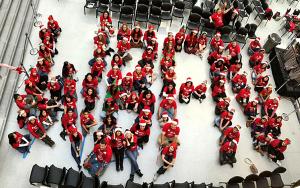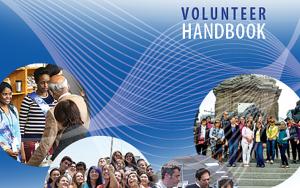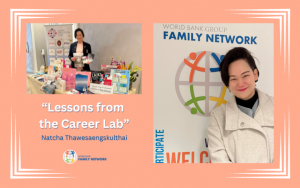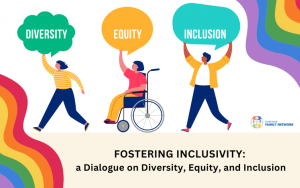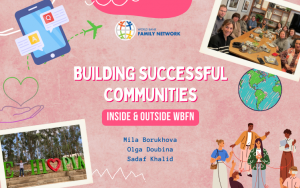
Shakespeare, Molière & WBGFN a collaboration by Catherine Mathieu, Yvonne Quahe, Shalu Advani, Ewelina Mstowska, and Paul Corsi
Let’s go back to where the story began. With the rapid expansion of the World Bank in the late 60’s, also came about poignant stories of bank families facing difficult resettlements. With staff leaving on mission almost immediately after joining the bank, spouses with children were left in hotel rooms, facing language barriers, with no friends or family support. This is when, based on the acute need, wives of senior staff came together to do something to welcome families, but were faced with skepticism by the then Bank Personal Department, now known as HR. However, “the greater the obstacle, the more glory in overcoming it”, this didn’t deter our ‘Founding Mothers’ from their mission.
After a couple of years of brainstorming, planning, and informal lobbying with the highest levels of the Bank’s hierarchy, in 1971, the ‘Founding Mothers’ were ready to hold their first formal meeting, calling themselves WIVES – Women’s Information and Volunteer Services.
It was in 1972, that the Bank President Robert McNamara heard a statement from WIVES and concurred on the importance of having a volunteer organization responding to “greater assistance to families”. President McNamara gave the green signal, providing office space and a small budget to cover operational expenses (mostly mailing and hospitality costs), as well as an administrative officer to liaise with the Bank Personal Department. A letter was sent to all Bank wives announcing the creation of WIVES. Within weeks, over 400 replies were received from speakers of 47 languages, with the respondents indicating willingness to help with welcoming and other programs.
The rest, as they say, is history. Let’s look at the years that ensued and carved the path for WBGFN.
1973: The action started with the release of the first newsletter; monthly open houses; approval of the by-laws; first EC election; welcoming material written and translated in several languages; interest groups; family life conversation group.
Click here to see our milestones over 5 decades
In conclusion, we can safely say that the basic needs of a family do not change. We all need security, a support network, and information related to a new location. We all fight against uncertainty and isolation. Technology has changed the way we operate, but needs, as much as they evolve, basically are the same as they were 50 years ago: spouse employment, friendship, schooling, health facilities, etc.
Looking towards the future, we can expect a fast-paced changing world, but the Family Network with its solid yet flexible foundation will continue responding to the community needs. The raison-d’être of the Network is universal, like Moliere and Shakespeare’s themes in their plays, as well as global, with effective support all around the world in Country Offices. The “How” and the “What” change constantly but the “Why” remains the same. The institutional memory is golden and irreplaceable, and we are forever grateful to our Founding Mothers, their vision, the battles they have won, and their successes. They set the ground with everything it takes to be successful. We follow their example, still valid in our completely changing world.
Quotes
- Anne Dickerson, President 1985/1988: The strength of an organization like WBVS is its ability to adapt to the times while still retaining the core values of caring, nurturing, challenging, and responding.
- Hada Zaidan, President 1996/1997: As we approach the new millennium, we can be proud of the achievement of WBVS and its dedicated volunteers. In addition to our basic mandate of welcoming volunteers, the organization has become a strong advocate for its members with Bank management.
- Priscilla Linn, Spouse Employment Committee, 1985: In my work with the Job & Career Committee, I learned that obtaining work permits was the three-aspirin-headache for most of G-IV visa holders. […] I discovered that the issue of work permits had been one of the first concerns of WIVES in 1972. [… WIVES] met with the Bank’s Director of Personal and explained the frustration wives encountered in obtaining permits. But the meeting had no results.
- Rukhsana Mehta, President 1989/1991: Because the Bank is immune to US court orders, a staff member could ignore a divorce order or decree granted by a court that required payment of alimony, child support, or a pension. […] WBVS forcefully highlighted to Bank management the injustice faced by divorced spouses. Initially the Bank could not see a way of solving the difficulty. It took many years of convincing and negotiating […] before a change was made.

